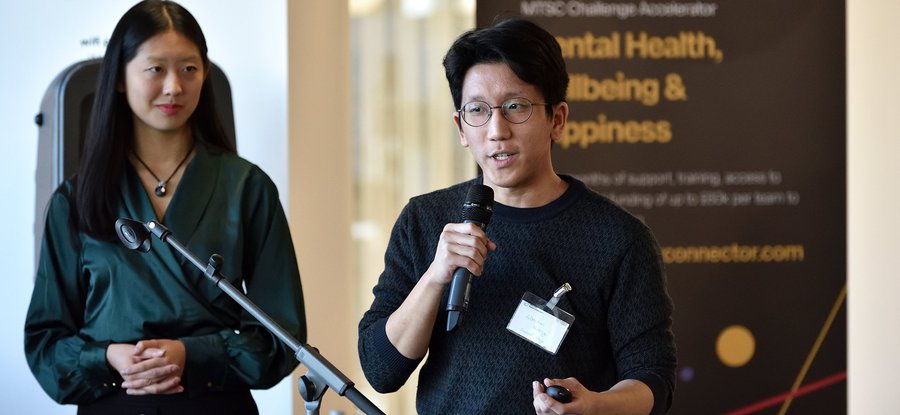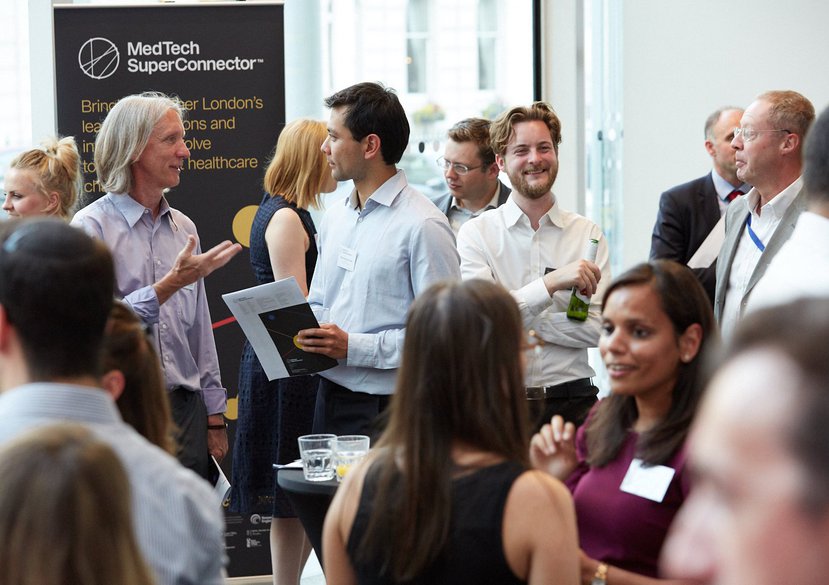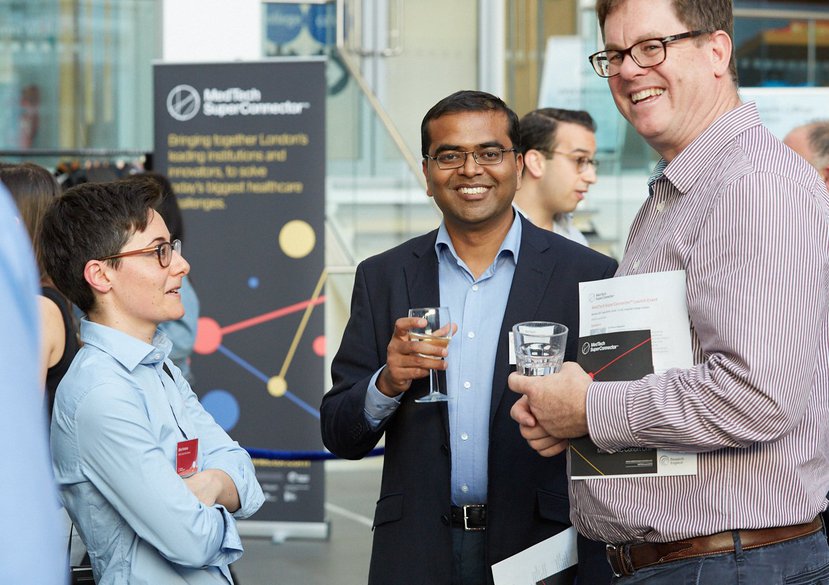
MedTech SuperConnector (MTSC) is an open experiment in medtech acceleration from research bench to a physical device, technology, application or service to improve people's health and wellbeing.
In 2018, MedTech SuperConnector (MTSC) became one of 18 innovative projects funded by Research England’s Connecting Capability Fund (CCF). The goal of the MTSC is to engage in strategic collaboration with higher education institutions (HEI) and research partners; to increase commercialisation potential of research outputs; and to contribute to economic growth in line with the UK government’s Innovation Strategy.
At a glance
- £356,759 total funding awarded
- 3 innovative wearable devices developed
- £9 million follow-on funding from public and private investors
“We believe art, design and social science are key enabling factors for innovation.”
Head of Knowledge Exchange
Gallery
More information
Our approach
The RCA is one of eight partner institutions within the MTSC consortium, led by Imperial College London. An open experiment in medtech acceleration, MTSC programmes are set up to support early career researchers (ECRs) fast-track the commercialisation of their early-stage medtech innovations. In doing so it aims to share the resulting learnings and best practice across the consortium partners to become a world leading organisation for supporting and accelerating the commercialisation of early-stage medtech innovations. After the three-year experimental phase, the MTSC is now collating the learnings and impact of the programme. It has recently been awarded two further years of funding in a follow-up round from the Connecting Capability Fund, enabling it to continue supporting medtech innovations and expand its offering.
Projects supported
Charco Neurotech
Discreet wearable devices to reduce slowness and stiffness in people with Parkinson’s Disease.
Haptic Illusion
Immersive palpation training for doctors and medical students, using a haptic interface and virtual reality.
KnitRegen
Smart textile garments to help people who have neurological conditions recover upper limb function
SimTouch
Simulating human affective touch to aid mental health with elegant wearable devices
Topographies of Pain
Helping patients in both conscious and unconscious states to self-report pain symptoms through a visual and tactile interface.
Leveraging external investment
Two of the ECRs supported by MTSC, Lucy Jung and Laura Salisbury, have now launched fully-fledged companies that have attracted significant external, private investment. Charco Neurotech, headed by Lucy, has developed a discreet, elegant wearable device that delivers focused vibrotactile stimulation to reduce symptoms of slowness and stiffness in people with Parkinson’s Disease. In 2021, the company raised $10 million from Amadeus Capital Partners Parkwalk Advisors and others – thought to be the largest seed financing round that year in Europe for a health technology device.
Meanwhile, Laura’s company KnitRegen is developing smart textiles to help people who have neurological conditions recover upper limb function. The company has attracted seed funding from Venrex Investment Management LLP in order to develop its first functional garment for brain injury survivors by summer 2022. Laura herself also won a Future Leaders Fellowship from UKRI, worth £1.2million, and the Health Award from the Mayor of London’s Entrepreneur Competition.
Laura explains her design philosophy, which dovetails with the RCA approach: “We’re pairing great design with science, understanding people’s behaviours and trying to create a really desirable, useable and suitable product that isn’t stigmatising,” she says.
Building capacity in robotics
One specific area where the MTSC has really brought tangible benefits to the research and innovation is that of robotics – particularly soft robotics with applications in healthcare. In 2017, the RCA established the RCA Robotics Laboratory led by Dr Sina Sareh who has been building capacity in different sectors and industries.
Sina has supervised four students from different MTSC cohorts. All ventures have used soft robotics, as well as other technologies such as virtual reality (VR), to either improve the performance of doctors or bring benefits to patient wellbeing.
For example, Dongyuan Li’s project, called Haptic Illusion, saw him create an innovative new setup for training doctors and medical students in palpation (feeling for differences in tissue type that might indicate disease such as a tumour). Usually, this is done using expensive rubber models. But Dongyuan was able to simulate palpation using soft robotics coupled with VR in a more immersive and costeffective manner. Using some of the same underlying technology, Yaqi Xie, another RCA ECR, came up with a completely different application – assisting patients in both conscious and unconscious states to self-report their pain symptoms (Topographies of Pain).
“The MTSC has certainly made our portfolio richer in specific areas,” Sina says. “We have increased capacity, both in terms of the equipment and setup we now have and perhaps more importantly the lab skills that our team has gained this area. What that means is we are now more ready to support future projects in this area – so if a new project comes along, we can start from day one and apply this know-how in different areas of medicine.”
Forging new connections
The MTSC has been instrumental in helping the RCA forge new connections. For example, building on deep and historic ties between the RCA and Imperial, Sina has been working with Alison McGregor, a Professor of Musculoskeletal Biodynamics at Imperial’s Department of Surgery and Cancer, progressing ideas that came out of the MTSC. This has helped in facilitating access to clinical settings and patient groups. The team has also explored some collaborations with the pharmaceutical firm GSK.
It has also helped connections more broadly, at a national level. The MTSC is a Connecting Capability Fund (CCF) project from Research England and makes up an important cornerstone of the government’s industrial strategy. There are 17 other CCFs across different areas focusing on everything from the internet of things to agritech. Using its design capabilities and user-driven innovation, the RCA was invited to become an associate, then full, member of a CCF called ASPECT (A Social sciences Platform for Entrepreneurship, Commercialisation and Transformation). Led by London School of Economics (LSE), ASPECT aims to support innovation, entrepreneurship, and research commercialisation in social sciences.
The MTSC and ASPECT are now exploring potential collaborations and cross-fertilisation of ideas, bringing arts, design and social sciences to drive innovation, economic recovery and sustainable development.
Ask a question
Get in touch to find out how we can help your business grow.
[email protected]








